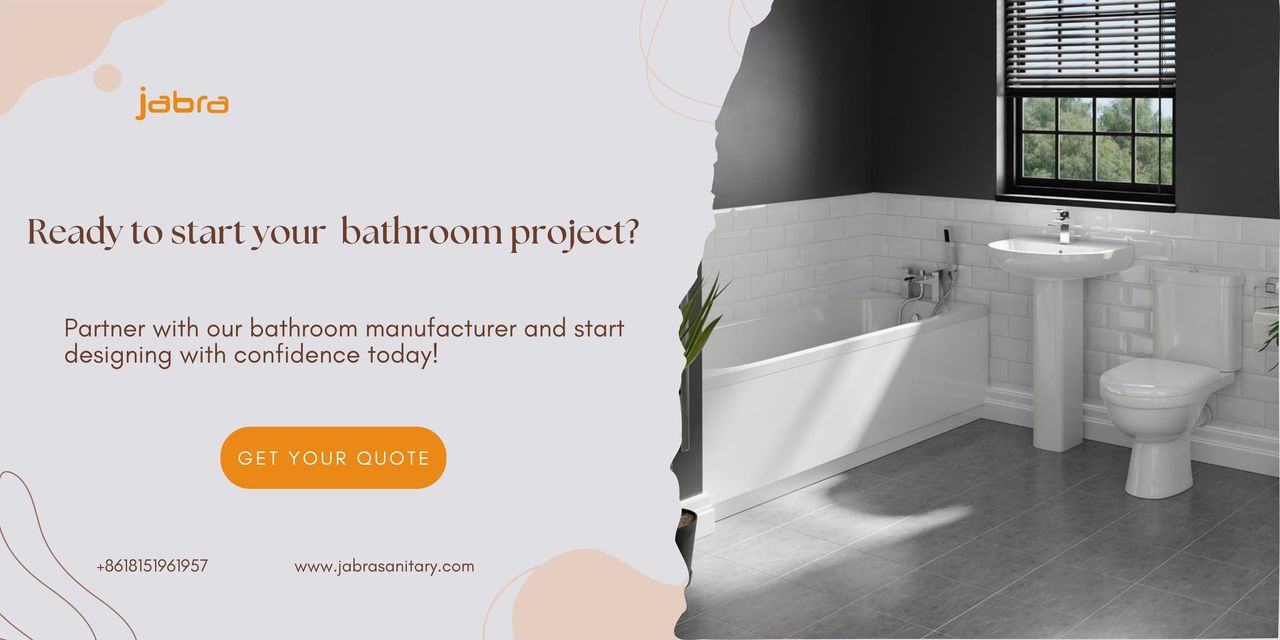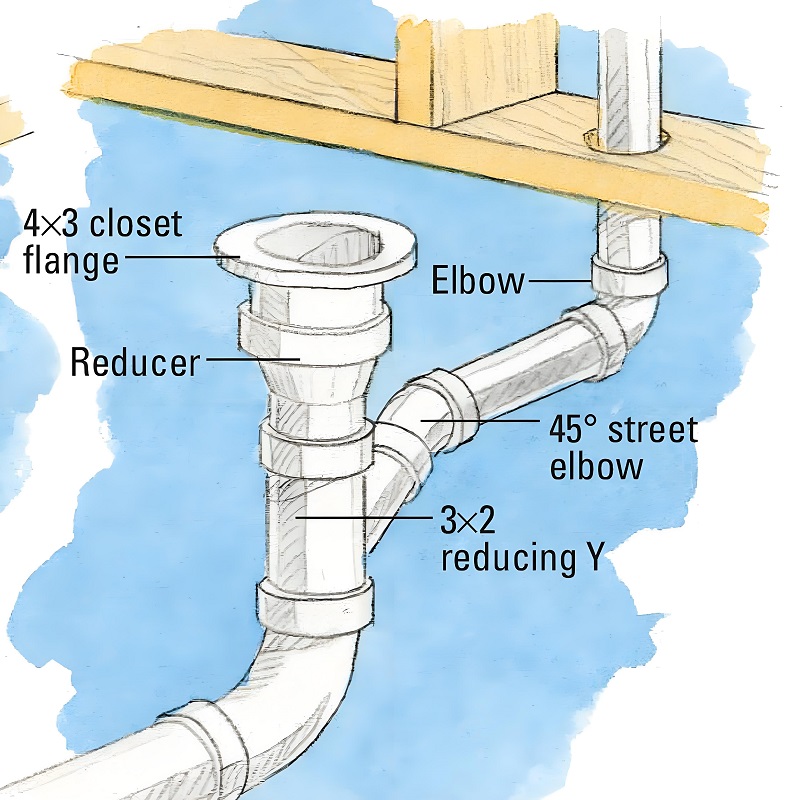 English
English
Jabra Sanitary is a sanitaryware supplier offering toilets, sinks, faucets, bathtubs, etc., at competitive prices. If you're a distributor, wholesaler, or project contractor, get a quote today!
 $23.9 Limited-time Offer
$23.9 Limited-time Offer Consignment Policy
Consignment Policy 20 Years of Experience
20 Years of Experience
Did you know that hard water is a sneaky troublemaker in many homes across the United States? According to the U.S. Geological Survey (USGS), hard water is especially common in the east-central and western regions, affecting millions of us every day.
Whether we're washing dishes, doing laundry, or stepping into the shower, hard water can quietly cause chaos—especially in our bathrooms. So, what's the deal with hard water, and why does it matter when we're picking out the best faucets for hard water?
In this article, we're going to walk through everything we need to know about hard water and how it affects our bathrooms. This guide helps you save money and time by choosing the right materials.
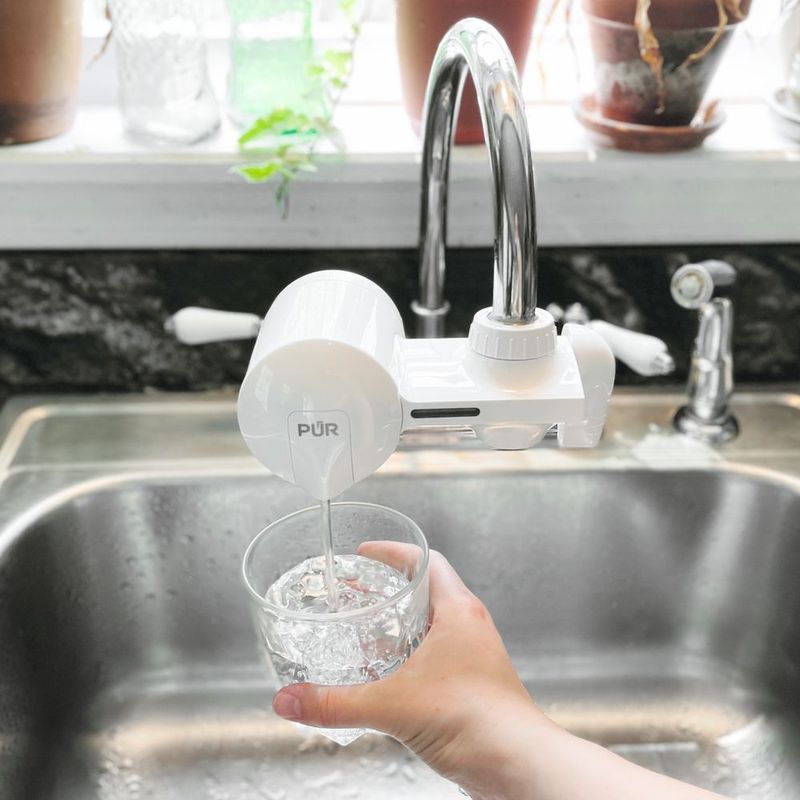
Table of Contents
What is Hard Water?
The Impact of Hard Water on Bathroom Products
Best Countertop Materials for Hard Water Resistance
Sink Materials That Resist Hard Water Stains
Faucet Finishes for Hiding Hard Water Deposits
Showerheads for Hard Water: Features to Look For
Tile and Grout Solutions to Prevent Hard Water Stains
How to Protect Your Home from Hard Water Damage
Hard Water-Resistant Bathroom Fixtures: Top Brands
Case Study: A Hard Water Bathroom Makeover
FAQs
Summary
What is Hard Water?
Hard water is water that contains high levels of minerals, mainly calcium and magnesium. These minerals get into the water as it flow through the ground, picking up tiny bits of rocks like limestone, chalk, and dolomite. Picture water as a sponge, soaking up these minerals as it travels underground until it reaches your tap.
You might wonder, "Aren't minerals good for us?" Sure, calcium and magnesium are great for your bones and health, but when there's too much in your water, they start damaging infrastructure. The U.S. Geological Survey says about 85% of American homes deal with hard water—that's most of us!
According to the Water Quality Association, the hardness scale is measured in gpg of calcium carbonate.
The Impact of Hard Water on Bathroom Products
Hard water might not sound like a big deal, but it can create some real challenges in our bathrooms. The minerals in hard water leave behind messes that affect everything from our pipes to our faucets.
Scale Buildup: The Silent Clogger
One of the trickiest problems hard water causes is scale buildup. As water moves through our pipes and fixtures, it drops off tiny mineral deposits.
Over time, hard water minerals act like sandpaper on fixtures. The result? Lower water pressure turns our showers into a disappointing drizzle.
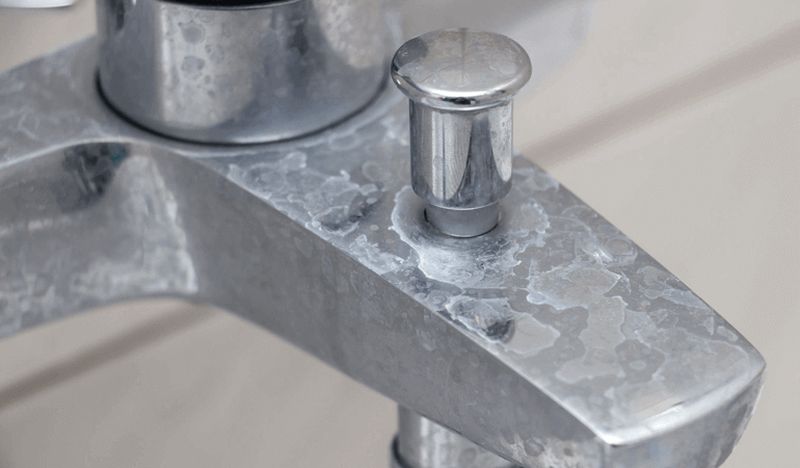
Corrosion: Eating Away at Our Fixtures
Hard water doesn't stop at clogging; it can also speed up corrosion. The minerals react with metal fixtures like faucets or drains, causing rust or wear to happen faster.
Before we know it, we're dealing with leaks or replacing things more often than we'd like.
Soap Scum: The Sticky Mess
If you've ever seen a cloudy, sticky film on your sink or shower glass, you've met soap scum. Hard water makes it tough for soap to lather up properly. Instead, it mixes with the minerals and leaves behind a grimy residue that sticks to everything.
Reduced Efficiency and Lifespan of Appliances
Hard water also takes a toll on bathroom appliances like water heaters (or even washing machines if they're nearby). The mineral buildup inside forces these machines to work harder, use more energy, and wear out faster.
A water heater might last 10-15 years with soft water, but hard water can cut that down to 5-7 years.
Best Countertop Materials for Hard Water Resistance
Picking the perfect countertop for your bathroom isn't just about style—it's about finding the best sink material for hard water that can tackle hard water without breaking a sweat.
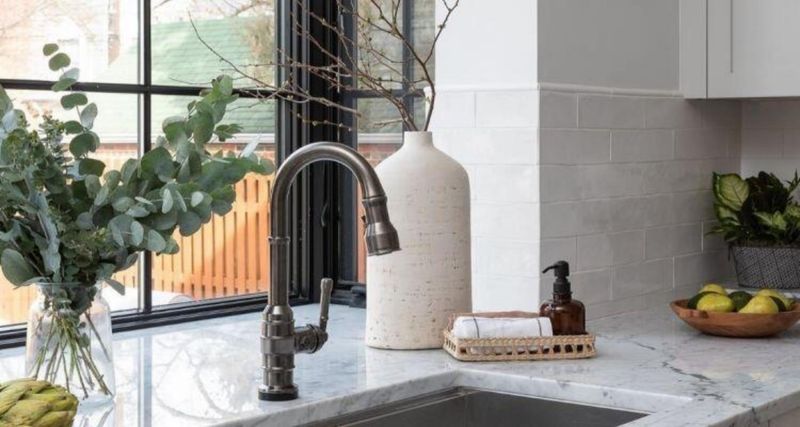
Quartz: The Low-Maintenance Star
Quartz is certified by the NSF for non-porous surfaces. That means it doesn't soak up water or minerals—hard water stains around faucets and deposits just sit on top, ready to be wiped away.
Tip: Keep it sparkling with a quick wipe using mild cleaner and water—no need for harsh chemicals!
Solid Surface: The Flexible Fighter
Solid surface countertops, made from acrylic or polyester blends, are another smart pick. They're non-porous too, so they fend off hard water stains around faucets and water damage with ease.
Tip: Use a soft cloth and gentle cleaner to avoid scratches. Skip placing hot items directly on it to maintain its condition.
Porcelain Slabs: The Sleek Survivor
Porcelain slabs are gaining fans for their durability and water resistance. Made from clay fired at high heat, they form a dense, non-porous surface.
Tip: Clean with mild detergent and water. Steer clear of abrasive cleaners to preserve its shine over time.
Avoid: Natural Stone Like Marble or Travertine
Natural stones like marble or travertine might catch your eye, but they're not ideal for hard water zones. They're porous, so they soak up water and minerals, leading to stains and etching.
Tip: Love that natural stone vibe? Use it in low-water spots like a powder room and pair it with a water softener to cut down on mineral buildup.
Sink Materials That Resist Hard Water Stains
Choosing the best sink material for hard water is key to keeping your bathroom looking fresh and clean, especially when hard water is in the mix. Hard water leaves behind mineral deposits that can stain and dull surfaces, so you need a sink that can handle the challenge.
Stainless Steel (Grade 304/316): The Hard Water Hero
Stainless steel is a top pick for hard water bathrooms because it's corrosion-resistant and easy to clean. Grades 304 and 316 are especially tough, thanks to their mix of metals like chromium and nickel, which help prevent rust and staining.
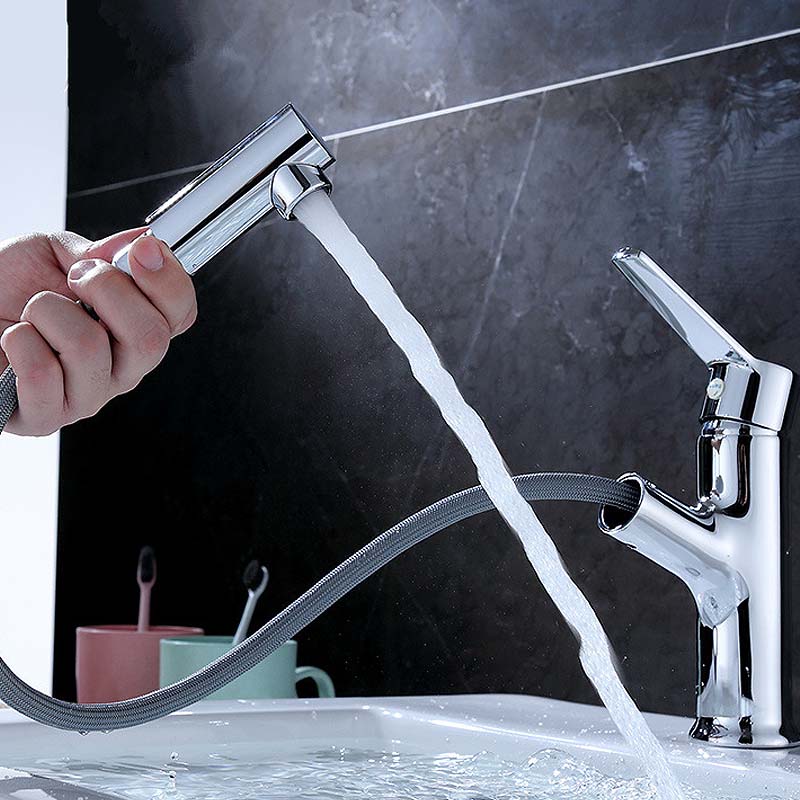 Ads
Ads
Bar Kitchen Sink Pull Out Faucet
The Bar Kitchen Sink Pull Out Faucet EF8212 is a premium choice for any modern kitchen. Crafted from high-quality brass, this pull out faucet for kitchen sink is both corrosion-resistant and environmentally friendly.
Faucet Finishes for Hiding Hard Water Deposits
Pesky white spots—called limescale or hard water deposits—can make even the prettiest faucet look dull and dirty. But don't worry! By choosing the best faucet finish for hard water, you can make those spots less noticeable and cut down on cleaning time.
Brass with PVD Coating: The Tough Protector
Brass faucets with a PVD (Physical Vapor Deposition) coating are a top choice for hard water areas. PVD is a special process that adds a thin, super-durable layer to the faucet's surface, making it resistant to corrosion, scratches, and tarnish.
Tip: Clean with a soft cloth and mild soap to keep it looking its best. Avoid abrasive cleaners that could scratch the coating.
Stainless Steel: The Sleek Survivor
Stainless steel is a classic for a reason—it's durable, corrosion-resistant, and has a modern look that fits many bathroom styles. Its smooth surface makes it less likely to trap mineral deposits.
Tip: Wipe it down after each use to prevent water spots. For tougher buildup, a mix of vinegar and water works like a charm.
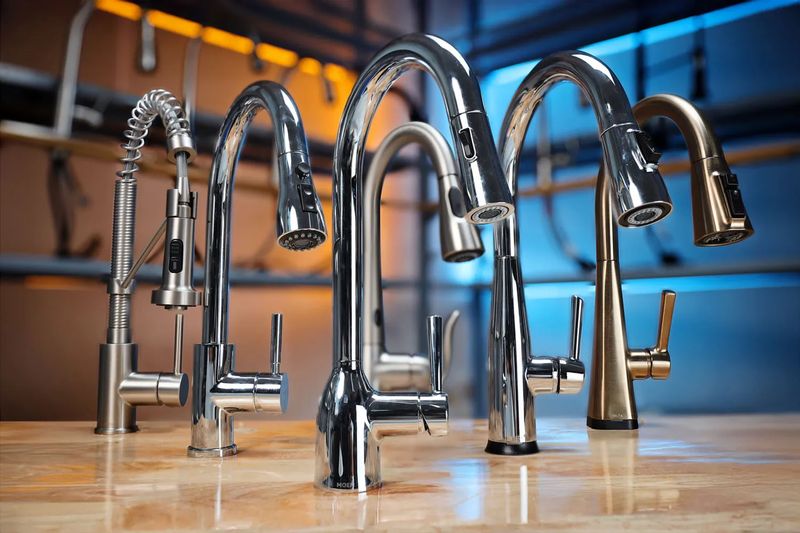
Satin Brass: The Subtle Star
Satin brass has a brushed, muted finish that's great at hiding water spots and fingerprints. Unlike shiny finishes, it doesn't reflect light as much, so deposits blend in better.
Tip: Use a soft cloth and gentle cleaner to maintain its finish. Avoid harsh chemicals that could damage the surface.
Satin Nickel: The Soft Shield
Satin nickel is another excellent choice with its soft, brushed texture. Like satin brass, it helps hide water spots and deposits, and it's resistant to corrosion and tarnish.
Tip: Clean with mild soap and water, and dry with a soft cloth to keep it looking fresh. Pair satin nickel with epoxy grout for a cohesive look.
Finishes to Avoid
While some finishes are great at hiding deposits, others can make them more noticeable:
- Matte Black: This trendy finish can be a magnet for white spots, which stand out against the dark color. It's also tricky to clean without leaving streaks.
- Chrome: Chrome's high-shine surface highlights every water spot and fingerprint, requiring frequent cleaning to stay sparkling.
- Polished Nickel: Like chrome, polished nickel is highly reflective, making deposits more visible and demanding extra upkeep.
Showerheads for Hard Water: Features to Look For
Hard water can turn a relaxing shower into a frustrating experience. The minerals in hard water build-up inside showerheads, clogging the tiny nozzles and reducing water flow.
Over time, this can make your shower feel more like a weak trickle than a refreshing spray. But don't worry! By choosing the best shower heads for hard water with the right features, you can keep the water flowing smoothly and make cleaning a breeze.
Here are the top features that make a showerhead a great choice for hard water areas:
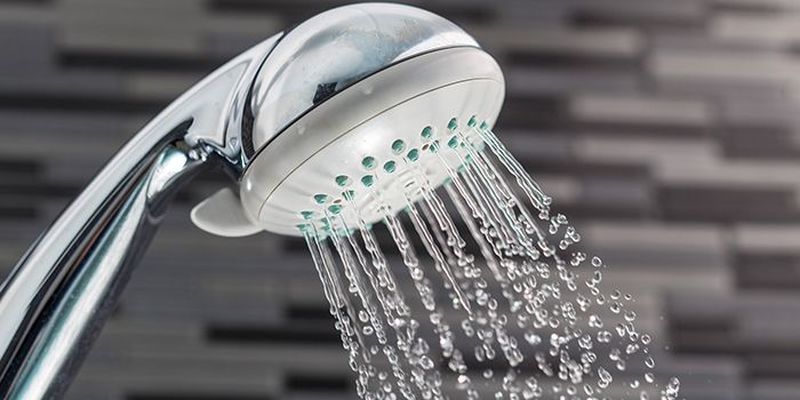
Self-Cleaning Nozzles: The Clog-Busters
Showerheads with self-cleaning nozzles are like superheroes for hard water. They have a special design that prevents mineral buildup from sticking inside the nozzles. Some use a mechanism that automatically cleans the nozzles every time you use the shower, while others have flexible parts that shake off deposits.
Tip: Look for showerheads labeled as "anti-clog" or "self-cleaning" to ensure they have this feature.
Rubber Jets: The Easy-to-Clean Option
Showerheads with rubber jets (also called silicone jets) are another smart pick. The rubber material is flexible, so you can easily wipe off any mineral deposits that form on the surface.
Tip: After each shower, give the jets a quick wipe to prevent deposits from hardening. It only takes a few seconds and keeps your showerhead working like new.
Filter Integration: The Mineral Neutralizer
Some showerheads come with built-in filters, like vitamin C or KDF (Kinetic Degradation Fluxion) filters. These filters help neutralize the minerals in hard water before they can cause problems.
Tip: Check if the filter is replaceable and how often it needs to be changed. Some filters last for months, while others may need more frequent swaps.
Tile and Grout Solutions to Prevent Hard Water Stains
With the right tile and grout choices, plus a few easy maintenance habits, you can keep your bathroom sparkling.
Best Tile Materials for Hard Water Areas
Picking the right tile material is your first line of defense against hard water stains. Here are the top contenders:
- Porcelain Tiles: Porcelain is highly durable at fighting hard water stains around faucet. It has a super-low water absorption rate (less than 0.5%), so it doesn't soak up water or minerals.
- Glass Tiles: Glass tiles are another fantastic pick. They're 100% non-porous with a slick surface that's a breeze to clean.
Quick Tip: Steer clear of textured or natural stone tiles (like slate or limestone) in hard water zones. Their bumpy surfaces grab onto minerals, making stains a bigger hassle.
Grout Solutions to Prevent Stains
Grout can be the trickiest part to keep clean, but the right type and care can make all the difference:
- Epoxy Grout: This is your best bet for hard water areas. Epoxy grout is non-porous.
- Grout Sealer: If you're using regular cement-based grout, slap on a grout sealer. It forms a protective shield to keep water and minerals out.
- Grout Color: Worried about visible hard water stains around faucet? Go for darker shades like gray or charcoal. They hide mineral deposits way better than white or light grout.
Tip: Try a product like Miracle Sealants 511 and reapply every 6 months for top-notch protection.
How to Protect Your Home from Hard Water Damage
You can protect your home with a few smart solutions and a little regular care. Here's how to keep hard water damage at bay.
Water Softeners: The Whole-House Hero
A water softener is one of the best ways to protect your entire home from hard water. It works by removing the calcium and magnesium minerals and replacing them with softer minerals like sodium or potassium. This process, called ion exchange, stops scale from forming in the first place.
Water Filters: A Targeted Solution
While water filters aren't made to remove hardness minerals, some types can help reduce their effects. For example:
- Reverse osmosis filters can remove a wide range of contaminants, including minerals, but they're usually used for drinking water, not whole-house treatment.
- Showerhead filters with vitamin C or KDF can neutralize minerals and chlorine, making your showers gentler on your skin and hair.
Vinegar: The Natural Cleaner
Vinegar is a simple, natural way to remove hard water stains from surfaces like faucets, showerheads, and tiles. The acetic acid in vinegar dissolves mineral deposits, making them easy to wipe away.
How to Use It:
- Mix equal parts white vinegar and water in a spray bottle.
- Spray the solution on stained areas and let it sit for 5-10 minutes.
- Scrub gently with a soft cloth or brush, then rinse and dry.
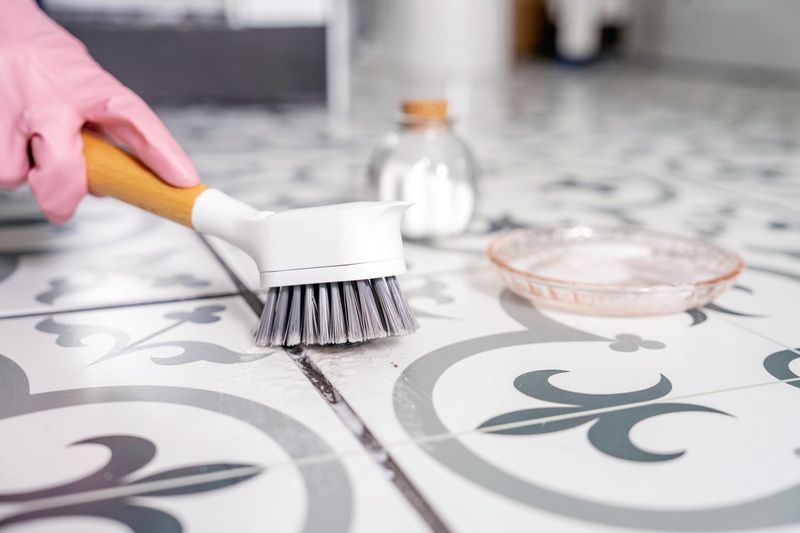
Descaling Cleaners: The Heavy-Duty Helpers
For stubborn stains or buildup, try a descaling cleaner made specifically for hard water. These products are designed to break down mineral deposits without damaging your surfaces.
Tip: Look for cleaners labeled "hard water stain remover" or "descaler," and always follow the instructions to use them safely. Avoid using them on delicate surfaces like marble.
Regular Maintenance: The Secret Weapon
A little regular care can go a long way in preventing hard water damage. Here's what to do:
- Inspect Fixtures: Check faucets, showerheads, and pipes for signs of scale or corrosion. Clean or replace parts as needed.
- Maintain Appliances: For water heaters, check the anode rod—a sacrificial rod that attracts corrosive minerals to protect the tank. In hard water areas, it may need replacing every 1-2 years.
- Clean Regularly: Wipe down surfaces after use to prevent water spots, and deep-clean with vinegar or descaler every few months.
Hard Water-Resistant Bathroom Fixtures: Top Brands
Choosing the right bathroom fixtures can make a huge difference if you live in an area with hard water. Here's a rundown of top brands that offer hard water-resistant fixtures, along with what makes them stand out.
Kohler: Katalyst Air-Inducing Showerheads
Kohler is a well-known name in bathrooms, and their Katalyst air-inducing showerheads are a smart pick for hard water areas. These showerheads mix air with water to create bigger, fuller droplets, which helps cut down on mineral buildup.
Delta: ShieldSpray® Technology
Delta brings innovation to the table with their ShieldSpray® Technology, a great choice for hard water bathrooms. This feature creates a strong, focused stream that fights off mineral deposits, keeping your showerhead running smoothly.
Grohe: StarLight® Chrome Finish
Grohe is a high-end brand offering fixtures with their StarLight® chrome finish, designed to push back against water and corrosion. It's a perfect fit for hard water environments.
Budget Pick: Jabra Sanitary
For an affordable option that still holds up, Jabra Sanitary delivers. They offer stainless steel and brass faucets with PVD Coating.
- Bonus Feature: These faucets have easy-to-clean surfaces, so you can wipe off deposits without harsh cleaners.
- Tip: Go for their brushed finishes to hide water spots and keep your bathroom looking tidy with little effort.
Case Study: A Hard Water Bathroom Makeover
Living in a place like Arizona, where water hardness can hit a whopping 300 parts per million (ppm), can turn a beautiful bathroom into a battleground. We recently came across a homeowner who was fed up with the constant issues caused by hard water.
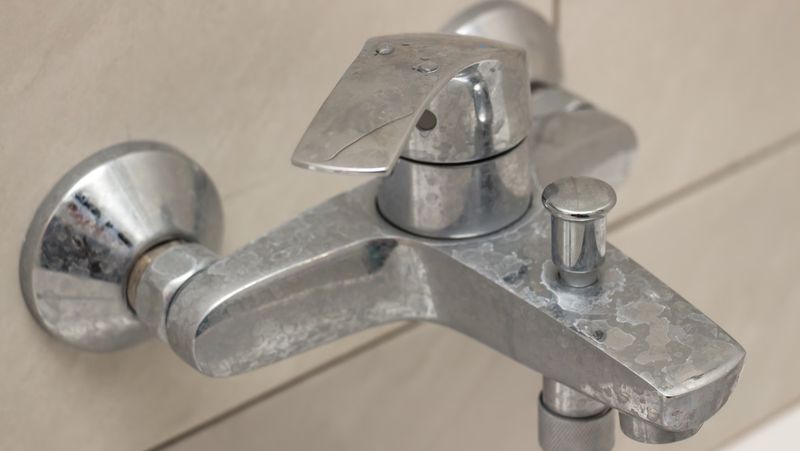
The Problem: Hard Water Takes Its Toll
Arizona's water is packed with minerals like calcium and magnesium, and those culprits hit this bathroom hard. Here's what the homeowner was dealing with:
- Corroded Fixtures: Limescale buildup had clogged faucets and showerheads, cutting water flow and leaving everything looking worn out.
- Stained Tiles: Mineral deposits left ugly marks on the tiles, making the space look dingy no matter how much scrubbing happened.
The Solution: Smart Upgrades That Worked
The homeowner didn't mess around—they went straight for a trio of upgrades that tackled hard water head-on:
1. Kohler Forté Showerhead with Epoxy Grout
- As recommended in Section 10, the Kohler Forté showerhead mixes air with water to create bigger, fuller droplets.
- Pairing it with epoxy grout was a game-changer. This non-porous material sealed the tiles tight, stopping minerals from sinking in and making cleanup a snap.
2. Stainless Steel Faucets from Jabra Sanitary:
- Next up, we installed Jabra Sanitary's stainless steel best faucets for hard water. These beauties are tough as nails, resisting corrosion and shrugging off mineral buildup while adding a sleek, modern vibe.
3. Salt-Free Water Conditioner (TAC System)
- To top it off, we added a TAC system. It can reduce scale by 80%.
The Result: A Total Turnaround
The payoff was incredible, and we couldn't be happier with how it turned out:
- 90% Less Cleaning Time: With stains and buildup gone, the homeowner barely had to lift a finger to keep things sparkling.
- Fixtures Lasted 3x Longer: The combo of durable materials and conditioned water meant no more frequent replacements—everything held up like a champ.
FAQs
Below, we've answered some of the most common questions about hard water and its effects on your bathroom.
Why is it costly to use hard water?
Hard water is packed with minerals like calcium and magnesium, which can cause trouble over time. These minerals build up as limescale, clogging faucets, showerheads, and pipes.
This reduces water pressure and makes appliances like water heaters work harder, driving up your energy bills.
How can I convert hard water to soft water?
The best way to soften hard water is by installing a water softener. These systems use ion exchange to replace calcium and magnesium with sodium or potassium, making water gentler on your bathroom and skin.
Not ready for a full softener? Try a salt-free water conditioner (like the TAC system we mentioned earlier). It doesn't remove minerals but prevents them from sticking to surfaces.
How do I tell if my house has hard water?
Here are the big clues:
- Soap Scum: Soap doesn't lather well and leaves a filmy residue on tubs or sinks.
- Mineral Deposits: White, chalky buildup shows up around faucets, showerheads, or drains.
- Reduced Water Pressure: Limescale in pipes can slow your water flow.
- Dingy Laundry: Clothes look dull or feel stiff after washing.
How do I test my water hardness at home?
Here's how:
- Use a Test Kit: Grab a water hardness test kit from a hardware store or online. Dip a strip in your water and match the color to a chart.
- Check with Your Water Utility: Many providers offer free water quality reports that include hardness levels.
- Look for Signs: If you're seeing lots of soap scum or buildup, that's a strong hint your water's hard.
Can hard water stains become permanent?
Hard water stains can be tough, but they're usually not permanent if you tackle them early. Regular cleaning with vinegar or a hard water-specific cleaner can break down the minerals without harming your surfaces.
Summary
Hard water is a common challenge that affects bathrooms across the U.S.. It's loaded with minerals like calcium and magnesium, which can wreak havoc on your fixtures, tiles, and plumbing. But don't worry—after reading this guide, you've got the hard water bathroom solutions to fight back!
When it comes to beating hard water, Jabra Sanitary is a standout choice. It excels with affordable, durable stainless steel and brass faucets featuring PVD coating, resisting corrosion and hard water stains around the faucet. The above case study showed their products significantly reduced maintenance efforts and tripled fixture longevity.







